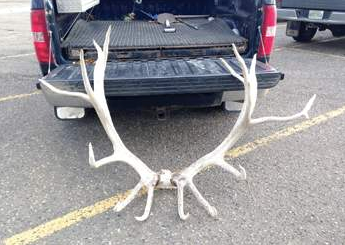Social media, online game meat ads and exotic pets don’t seem to have a lot in common. But in Saskatchewan and many other jurisdictions across the country, they’re adding up to a serious problem of wildlife trafficking and social media scams.
“We encounter these online advertisements daily,” says Bill Bone, conservation officer and senior investigator with the Ministry of Environment. “It’s a fairly significant problem across the province. What we are generally finding on there is dried meat, or meat for sale from fish and animals like deer, elk and moose.”
The selling and buying of wild game meat constitutes trafficking in wildlife, and is prohibited under Saskatchewan laws. For wild game or fish taken under a sport licence, the meat can never be sold. However, antlers or mounts of an animal or fish taken under a sport licence can be sold under a special permit.
“If someone posts something for sale and they either can’t get a permit or don’t list the permit, we look at the information and see if they have been warned before,” Bone explains. “Most of the time it’s someone who doesn’t know that what they are doing is illegal. We will contact them and let them know what they are doing is illegal and ask them to remove it from the site. They are also informed that this has been noted by the ministry and further sale or advertisements of this nature may result in charges.”
In most cases, the ads are pulled right away. In some cases, people will respond by asking the ministry what they need to do in order to comply with provincial laws. Legitimate sellers require permits to advertise, sell, barter, or trade in fish and wildlife, which can be obtained from a ministry office.
These types of advertisements are often found on Kijiji or Facebook buy-and-sell pages.
“Facebook is a different beast,” says Bone. “Those types of selling pages can be set up as an open group, which anyone can view, or it can be a closed group with administrator access. Any type of meat product is something to watch out for. This is not allowed, even if it has been taken under Aboriginal harvesting rights.” Aboriginal people can only hunt and use animal parts for themselves and their immediate families and are not permitted to sell it. This includes antlers and mounts.
For other individuals to sell a mount, they need a permit and have to show that it was lawfully taken under a sporting licence. If they can’t do that and there is no way of proving it was taken under a sporting licence, then a permit could be obtained to keep the mount in their household. But the mount can’t be offered for sale because it can’t be proven that it was taken lawfully.
“There are hundreds of these online buy-and-sell sites in the province,” says Bone. “We can’t be everywhere, but we are keeping tabs on what is going on.” These sites can also be monitored by enforcement agencies across the country.
In some of these instances, conservation officers will contact the page administrator and ask them to post a message from the ministry stating the legal issue at hand. If the individual posting the advertisement has been warned before, it may result in further scrutiny and charges.
Commercial fishermen are allowed to sell to the public, but they also have rules they must follow, such as recording the sale. This includes fish peddlers.
“So if you are buying fish from someone, they are required to give you a receipt,” Bone says. “Not giving you a receipt means that something may be wrong.”
The ministry’s investigators also run into a lot of social media ads for exotic pets such as snakes and monkeys. Constrictors or venomous snakes are illegal to own in Saskatchewan, while monkey ads are just completely fraudulent. These operators are very sophisticated. They have phony websites set up to track your purchase and they are difficult to bring to justice.
“We have investigated a number of these ads and we know of people who have bought into that scam,” Bone notes. “They lose their money and their monkey never shows up, which they can’t legally have in Saskatchewan anyway.
If you come across one of these advertisements, let your local conservation officer know.
Contact the Turn In Poachers (TIP) line at 1-800-667-7561 or #5555 for SaskTel cellular subscribers. You can also report a violation online at saskatchewan.ca/conservation.




